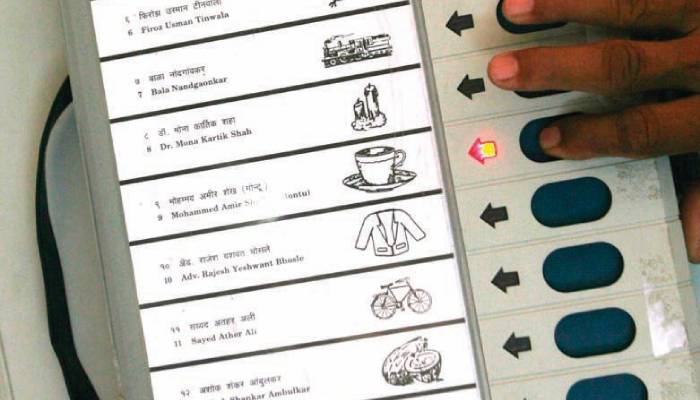
or

At a National Seminar on ‘Electoral Reforms in India in Contemporary Constitutional Perspective’ organized by Faculty of Law, University of Lucknow on 22nd April, 2012, some thought provoking ideas came forward
India is a democratic country. Democracy is part of the basic structure of the constitution and free and fair elections at regular intervals are essential to the proper functioning of a democratic system. Holding periodic, free and fair elections by the Election Commission is the basic structure of the constitution. At the very beginning of the seminar Chief Electoral Officer, Uttar Pradesh, UmeshSinha (I.A.S.) highlighted this fact and said that there was increase in women’s participation in election. He emphasised that we must try to achieve hundred percent registrations of voters, hundred percent voting and hundred percent ethical voting. He mentioned future challenges before us like NOTA (None of the above), recommendations of Election Commission of India made in 2004, pending Electoral Reform Bill, debarring people who are facing criminal charges from contesting elections, voters’ awareness and education, enhancement of punishment for electoral offences, decriminalization of politics. Pointing out the role of Election Commission of India Under Article 324, he said that ECI is a people’s institution, it is eye and ear of people and it has to provide level playing field to each and every party and candidate. He rejected the idea of right to recall and he said Indian people are like nuclear bombs that will explode after every five years.
Prof. R.K. Mishra Ex Dean Law School, BHU and Former Vice Chancellor of DDU, Gorakhpur University after giving a global panoramic overview of Electoralreform said that electoral reform is essentially a political issue not a legal issue. He said elections are political process and reform is also a political process, law only can lay down broader guidelines. He quoted Roscoe Pound who said: “there are limits of effective law making”. He again questioned the use of government machinery in a coercive method for conducting general elections. He said sometimes remedy is worse than the malady. He discussed the poor role of NGO in electoral process, allocation of seats by political parties on winability of candidate only, feudal outlook of parties, inefficient office bearers of political parties are aggravating problems.
Prof. B.N. Pandey, Professor, Law School, Banaras Hindu University informed that after Second World War nearly 125 countries became independent and out of which there are 4-5 countries where democracy survives in spirit. He pointed out that despite all shortcomings; problems India is a vibrant democracy
Prof. M.K. Mishra, Vice-Chancellor, University of Lucknow, said that electoral process in India, which he dubbed as ‘Dance of Democracy’ is still feudal in itsoutlook. In conducting general election, public order should be maintained; deployment of public transport on a large scale should be prohibited. He also talked about the sizeable representation instead of majority rule.
After the inaugural session, the seminar in order to maintain uniformity for sharing and exploring ideas and opinions on certain issues pertaining to electoral reform was classified in the three technical sessions: Election Reforms in India, Right to Reject & Right to Call, and Compulsory Voting and Election Commission.
In the session on Election Reforms in India 44 papers were submitted by academicians and students. The discussion, debate and deliberations were on the issues of criminalization of politics, recommendations of ECI in 2004, Electoral Reform Bill, registration of political parties, NOTA, Voting patterns and sizeable representations, fair advertising, right to recall, position of Independent candidate, debarring of candidate who are facing criminal charges, retirement age for politicians.
The LW Bureau is a seasoned mix of legal correspondents, authors and analysts who bring together a very well researched set of articles for your mighty readership. These articles are not necessarily the views of the Bureau itself but prove to be thought provoking and lead to discussions amongst all of us. Have an interesting read through.

Lex Witness Bureau

Lex Witness Bureau

For over 10 years, since its inception in 2009 as a monthly, Lex Witness has become India’s most credible platform for the legal luminaries to opine, comment and share their views. more...
Connect Us:


The Grand Masters - A Corporate Counsel Legal Best Practices Summit Series
www.grandmasters.in | 8 Years & Counting
The Real Estate & Construction Legal Summit
www.rcls.in | 8 Years & Counting
The Information Technology Legal Summit
www.itlegalsummit.com | 8 Years & Counting
The Banking & Finance Legal Summit
www.bfls.in | 8 Years & Counting
The Media, Advertising and Entertainment Legal Summit
www.maels.in | 8 Years & Counting
The Pharma Legal & Compliance Summit
www.plcs.co.in | 8 Years & Counting
We at Lex Witness strategically assist firms in reaching out to the relevant audience sets through various knowledge sharing initiatives. Here are some more info decks for you to know us better.
Copyright © 2020 Lex Witness - India's 1st Magazine on Legal & Corporate Affairs Rights of Admission Reserved